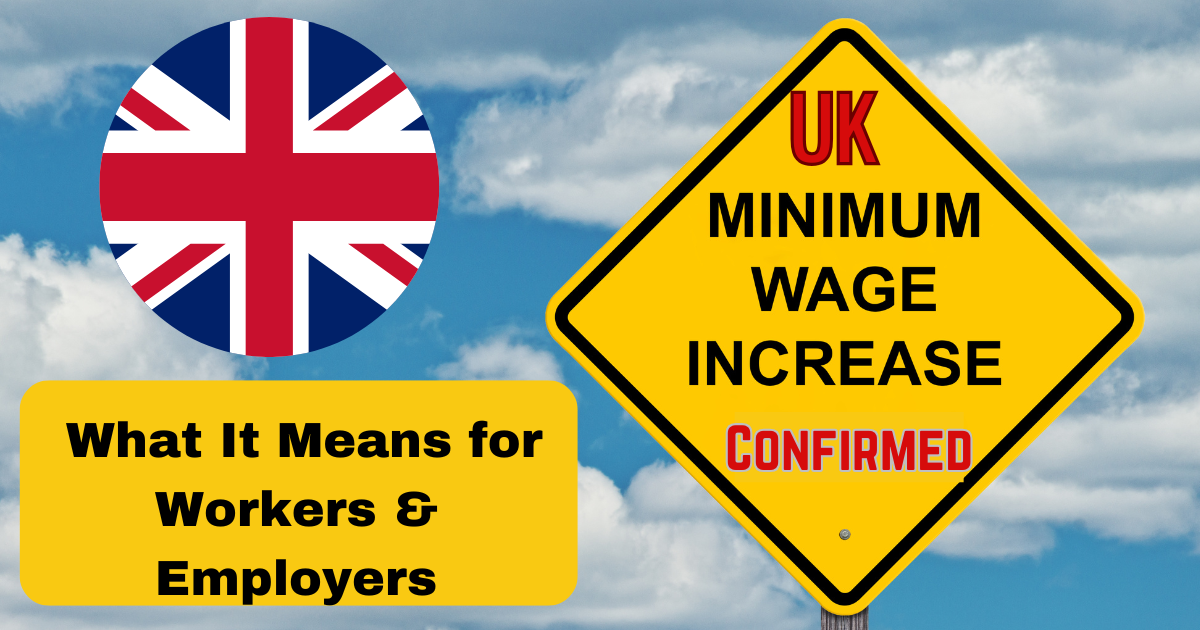Breaking: 2025 UK Minimum Wage Increase Confirmed – What It Means for Workers & Employers: Starting in April 2025, the National Minimum Wage for workers aged 21 and over will increase by 6.7%, rising to £ 12.21 per hour. This adjustment, which is three times the currents inflation rate, underscores the government, which is three times the current inflation rate, underscores the government`s commitment to improving wages for adult employees.
Breaking: 2025 UK Minimum Wage Increase Confirmed
The UK Government annually reviews minimum wage rates relying on recommendations from the Low Pay Commission an independent body that evaluates factors such as the cost of living, business impacts, and economic conditions.

Check Payment Dates
Check New Payment Amount
Check Payment Increase News
Check New Eligibility Criteria
The National Living Wage for those aged over 21 will increase by 6.7% to £12.21 per hour. The National Minimum Wage for 18-to-20-year-olds will increase by 16.3% to £10.00 per hour squared. The apprenticeship rate, for 16-17 years olds will increase by 18% to £7.55 per hour.
younger workers will also benefit from the notable increase in the National Minimum Wage rates:
- Ages 18-20: A 16.3% rise to £ 10.00 per hour
- ages 16-17 and apprentices: An 18% increase to £7.55 per hour
Additionally, accommodation offset, a permitted deduction for employers providing housing, will increase by 6.7%, bringing it to £10.66 per day.
Changes to Statutory Sick Pay (SSP) in 2025
Statutory Sick Pay will also see changes in 2025. The weekly rate will increase from £116.75 to £118.75 to reflect living cost adjustments. A notable reform will eliminate the earnings qualification threshold, meaning all employees, regardless of their pay level.
What is the National Minimum Wage?
The National Minimum Wage is the lowest legal hourly rate that employers must pay workers in the UK. It is reviewed and updated annually based on recommendations from the low Pay Commission (LPC).
| Age Group | Current Rate (2024) | New Rate (2025) |
|---|---|---|
| 18-20 (Minimum Wage) | £7.49/hr | £8.17/hr |
| 16-17 (Minimum Wage) | £5.28/hr | £5.92/hr |
| Apprentices | £5.28/hr | £5.92/hr |
How These Wage Increases Affect Employees and Employers
For employees
If you Earn the Minimum wage, expect a pay rise in your April paycheck. This increase helps improve financial stability and purchasing power, espeially with rising living costs.
For Employers
Employers must adjust payroll systems to comply with the new wage rate. Failure to do so can result in fines, legal action, and reputational damage. Small businesses should plan to accommodate higher wage expenses.
Long-Term Implications for Employers
- Increased Labor costs could lead to adjustments in hiring strategies.
- Some businesses may invest in automation to reduce reliance on human labour.
- Higher wages might result in greater employee satisfaction and productivity, reducing turnover rates.
Practical Steps for Employers to Prepare
1. Review Employee Salaries
Check which employees are affected and ensure their wages align with the new rates.
2. Update Payroll Systems
Inform payroll providers or update internal payroll software to reflect new wage rates.
3. Budget for Increased Costs
Plan for increased wage expenses in financial forecasts to avoid unexpected strain on business finances.
4. Communicate with Employees
Keep employees informed about their new wages to maintain transparency and trust.
Legal Requirements for Employers & Workers
Ensuring compliance with minimum wage laws is not only a legal obligation but also an important aspect of maintaining fair and ethical business practices.
1. Legal Framework
The legal framework governing the UK National Minimum Wage. The main components of this framework include:
- National Minimum Wage Act 1998
- Employment Rights ACT 1996
- National Minimum Wage Regulations 2015
- The National Minimum Wage Regulations
- Low Pay Commission
- Enforcement and Compliance
2. Legal Obligations for UK Employers
By law, employers must comply with the following obligations is relation to pay:
- Paying the correct Minimum Wage
- Record Keeping
- Written Contracts and payslips
- Deductions and Payments
- Annual Reviews
3. Consequences of Non-Compliance
Employers who fail to pay the correct minimum wages may face fines of up to £20,000 per underpaid worker. The financial penalties can be substantial and impact the financial stability of a business. The UK government also publishes the names of employers who fail to pay the minimum wage, which can damage a business`s reputation and brand image and result in difficulties recruiting new staff.
Conclusion
In this article, we discussed the 2025 UK Minimum Wage Increase Confirmed – What It Means for Workers & Employers. If you are an employee or an employee, it is essential to understand how these changes impact you. Employees should expect a pay rise, while employers must adjust their payroll systems accordingly. The financial penalties can be substantial and impact the financial stability of a business.
